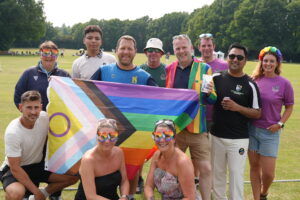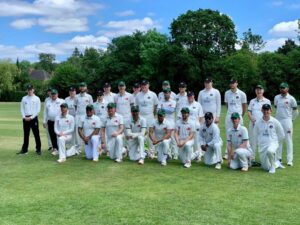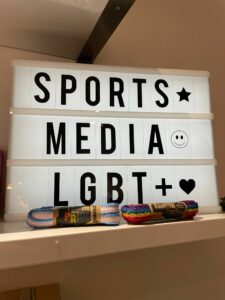The Role of Sports Media in Celebrating LGBT+ Stories
As LGBT+ History Month comes to a close, it is likely the prominence of queer stories in sport will diminish.
Search trends for LGBT+ almost exclusively spike in February (LGBT+ History Month) and June (Pride Month) but the media has a responsibility to continue publishing queer stories and to celebrate LGBT+ athletes all year round.
In interviews with Jon Holmes, Sports Media LGBT+ founder, Nakul Pande, Sky Sports News associate producer, and Leo Skyner, co-founder of Out4Cricket, all three mentioned exactly the same phrase: “If you can’t see it, you can’t be it.”
The Role of the Media
The importance of visibility of queer role models is undeniable and the role that the sports media plays is paramount in promoting LGBT+ narratives.

Nakul said: “It has almost become a cliché because it is so true: if you can’t see it, you can’t be it. It is so much easier once you have an example that it might work.
“LGBT+ History Month acts as a useful spur and incentive for broadcasters and for news outlets.
“The more positive coverage and the more people see themselves represented and see queer people being celebrated as athletes and working in sport, the more it starts to help create that attitude that sport is for queer people.”
Jon agreed, saying: “I remember the Steven Davies story and the impact he made. We did the piece on Sky featuring gay men at cricket clubs, about five years ago, all of them said that Steven Davies was a massive role model for them.
“They had all had times where they had wanted to give up cricket but having someone they could relate to, who they shared that part of their journey with, was absolutely massive and gave them the confidence to be themselves.”
Leo conveyed this sentiment too, saying: “On one hand, it is good to have a role model. On the other hand, you would only ever want that person to be entirely comfortable and it would entirely have to be their choice.”
“It would be good if we could move the media’s interest from ‘so-and-so is gay or not gay’ over to mass participation and growing LGBT+ participation rates so that people wouldn’t be looking the whole time for a poster boy or poster girl to solve the issue.”
The Creation of LGBT+ Groups
Both Jon and Leo felt that more could be done to highlight the LGBT+ issues within sport and increase participation rates.
After the first LGBT+ inclusive game between Graces CC and Birmingham Unicorns in 2021, Leo and his Out4Cricket co-founder Lachlan Smith created an action plan of how to build up LGBT+ inclusion in cricket. However, there was not the support they hoped for at first.

Leo said: “We posted that [the action plan] off to the national governing body and our respective counties. People politely nodded and said that’s terribly interesting, but it didn’t really go anywhere.
In early 2022 Leo and Lachlan knew more needed to be done to encourage LGBT+ participation and decided to try to do it themselves. Their idea paid off and Warwickshire and Middlesex jumped in to fund and host it.
“We were surprised at the convening power; about 60/70 people from across the game come to Edgbaston. We shared personal stories from some of our members which are incredibly powerful and tabled our action plan, in terms of what we think could be done next.”

Sports Media LGBT+ originally started as a way for people to connect but has since shifted into advocacy.
Jon said: “It’s about trying to guide newsroom culture and just show that we are there in newsrooms, press boxes, out on the field, broadcasting and there’s no room for anyone to be discriminated against on the basis of their sexual orientation or gender identity.
“The challenges have always been when we have come up against people who for whatever reason have wanted to make trouble for our community. We have come up against opposition in terms of tabloid newspapers peddling storing about secret gay footballers and that’s something that collectively we wanted to push back on. We’ve also joined up with other groups to stand against anti-trans hatred and abuse.”

Groups like Out4Cricket and Sports Media LGBT+ can have a hugely positive impact on the culture within sport. Nakul, who is a member of Sport Media LGBT+, thinks that many visibility campaigns are compromises. They meet people with issues about queer inclusion half-way, but campaigns must keep pushing their agendas.
He said: “I love the simplicity of rainbow laces. It started basically as a marketing stunt. It’s very simple but it is also very visible. It’s sort of malicious compliance: ‘well we can’t put much on the kits but ah, people change their boots and laces and they’re on the screen all the time.’”
“For me the answer is not to stop doing the symbolic, but to hold them [people in positions of authority] to account and say ‘no, you’ve got to do the structural as well,’ because the symbol is such an easy, quick and powerful shortcut to getting the symbolic through.”
The Importance of Allies
Having allies to the community is also crucial: whether they are in the media or on the pitch.
One of the simplest, yet most masterful moments of allyship within sport was by former England captain Joe Root, in 2019. After West Indian fast bowler Shannon Gabriel aimed a homophobic sledge at Root, the batter responded with: “Don’t use it [‘Do you like boys?’] as an insult. There’s nothing wrong with being gay.”
The impact felt from 12 simple words was vast.
Leo said: “Having the England captain saying that in a very natural way, it wasn’t scripted, it wasn’t part of a campaign, was huge. If the England captain says that, it changes perspectives.”
Jon agreed but also spoke of the negative impacts that leaders and captains can have too.
He said: “Athletes are the ones who create the environment around what is often the single isolated LGBT+ athlete. The Joe Root moment in itself was very short and sweet but made a big impact.
"Don't use it as an insult. There's nothing wrong with being gay."
Joe Root responds to sledging from Windies bowler Shannon Gabriel.
Full story: https://t.co/nRfSmWU5q6 pic.twitter.com/ghoDyGxUOi
— Sky Sports Cricket (@SkyCricket) February 12, 2019
“One of the reasons why there was a heightened awareness around Jordan Henderson’s move to Saudi Arabia was because Root and Henderson are leaders, are captains, are in positions of authority within that locker room culture.
“You looked at these people to set the tone as to what is and isn’t acceptable.
“In that kind of sporting environment, it is very difficult when captain and leaders take decisions which might have an impact on other people within that space, for good and for bad. We always need to look to our leaders and hope that they lead us down the right path.”
Allyship must be formed within changing rooms but the media’s championing of moments like Root’s is crucial. The ease of celebrating LGBT+ stories further reinforces why they must be published all year round and the more normalised queer athletes are within sport, the easier it is for the next.